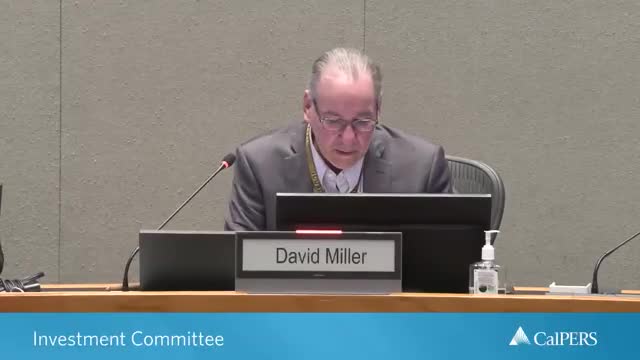CalPERS public commenters press board to remove fossil fuels from climate funds and to speed divestment
Get AI-powered insights, summaries, and transcripts
Subscribe
Summary
Dozens of retirees, union members and climate advocates urged the CalPERS investment committee to exclude fossil fuel companies from the Climate Action Fund and to fully divest, arguing moral and financial risk; staff and directors responded that engagement and fiduciary analysis are being used and that the committee's vote on TPA does not itself change divestment policy.
Dozens of CalPERS members, beneficiaries and advocacy groups used the public‑comment period to urge the Investment Committee to exclude fossil‑fuel companies from CalPERS' climate investments and to fully divest the system from fossil‑fuel producers.
Speakers represented retirees, unionized state workers and climate organizations. Sarah Theis, a CalPERS retiree, questioned whether "carbon‑intensity" measures reliably track environmental performance given scope‑3 and data limitations. Preston Rudy, a California State University retiree, urged the fund to "go carbon free and fossil fuel free," saying other systems have divested. Several SEIU callers and advocates cited research and a pending state lawsuit against fossil‑fuel companies as reasons not to invest in firms being sued and to avoid funding industries that lobby against climate policy.
Advocates argued divestment is both a moral imperative and a financial protection: claimants cited negative returns in the fossil sector in 2023, lobbying budgets of the industry, and the systemic public‑health costs of fossil activities. Other commenters urged more aggressive action on Tesla and other corporate governance concerns, requesting staff accelerate company‑specific reports and agenda items.
Staff and some board members responded during the meeting that the TPA adoption relates to governance and risk budgeting rather than an immediate divestment action. The committee did not vote to divest; rather, speakers used the public‑comment record to press the board to consider future actions and to clarify criteria for the Climate Action Fund. Staff noted CalPERS' ongoing sustainable‑investment work, including a climate action plan, a climate transition index, and other SI initiatives that aim to increase climate investments while using engagement and stewardship channels.
Next steps: the public comments were recorded in the meeting record, and speakers said they will submit materials in writing. The committee's adoption of TPA does not, by itself, implement divestment. Advocacy groups signaled they will continue to press for exclusionary criteria and for clearer definitions of "climate solutions."
